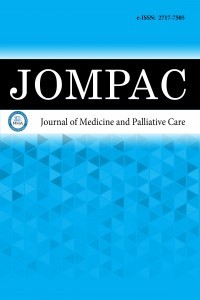Tüp bebek gebeliği ve posterior fossa apsesi: olgu sunumu ve ikiz gebelik deneyimi
Bu çalışmanın amacı, ikiz gebelik tanısı olan ve 23. gebelik haftasında beyin apsesi teşhisi konulup sonrasında acil ameliyata alınan olgumuzla preoperatif ve postoperatif bakım ve tüp bebek tedavisi yaklaşımımızı sunmaktır. Olgumuz cerrahi öncesi ve sonrası nörolojik muayene bulguları ve radyolojik sonuçlarıyla değerlendirilmiştir. Ekokardiyografi (EKO) bulguları normaldi ve 24 saatlik arteriyel kan basıncı takibinde hipertansiyon saptanmadı. Nörolojik muayenede sol taraflı iki taraflı vertikal nistagmus saptandı, motor defisiti yoktu. Bulgular ‘’soğuk apse’’ adı verilen irin ile dolu bir kist duvarını göstermekteydi. Bebekler 1700 gr ağırlığında, Apgar skoru 6/8; 2100 gr, Apgar skoru 8-9 ile dünyaya geldi. Kraniyal ve kardiyak ultrasonografi bulguları normaldi. Fetal EKO incelemeleri iyiydi ve bebekler de iyi durumda taburcu edildi. Gebe kadınların başvuru anında baş ağrısı ve baş dönmesi şikayetleri sadece preeklampsi veya baş dönmesine işaret eden intrakraniyal patolojileri düşündürmez. Maternal ve fetal sonuçları iyileştirmek için beyin cerrahı, kadın doğum uzmanı ve anestezi uzmanını içeren multidisipliner bir yaklaşım gereklidir.
Anahtar Kelimeler:
Arka çukur, serebellar apse, ikiz gebelik
In vitro fertilization pregnancy and posterior fossa abscess: case report and twin pregnancy experience
The aim of the present study is to give our preoperative and postoperative care and clinical in in vitro fertilization (IVF) approach on a 23-week-old twin pregnant woman undergoing surgery for the diagnosis of brain abscess. Our case was evaluated both with findings of the neurological examination and radiological results before and after the surgery. The echocardiography (Echo) findings were normal, and hypertension was not detected in the 24-hour arterial blood pressure. The neurological examination revealed left-sided bilaterally vertical nystagmus, and no motor deficit was detected. The findings indicated a cyst wall filled with pus so-called ‘’cold abscess’’. Babies were born with a weight of 1700 gr, Apgar score of 6/8, 2100 gr, and Apgar score of 8-9. Cranial and cardiac US findings were normal. Their fetal echo examinations were good, and also babies were discharged in good condition. The complaints of pregnant women about headache and dizziness at the time of admission do not only suggest intracranial pathologies, indicating preeclampsia or vertigo. A multidisciplinary approach involving neurosurgeon, obstetrician, and anesthesiologist is required to improve maternal and fetal outcomes.
Keywords:
Posterior fossa, cerebellar abscess, twin pregnancy,
___
- Nesrin A, Çiğdem A.H, Duygu Ç, et al. Two cases of intracranial abscess caused by parvimonas micra. Klimik Magazine 2016; 29: 47-50.
- Wax JR, Pinette MG, Blackstone J, Cartin A. Brain abscess complicating pregnancy. Obstet Gynecol Surv 2004; 59: 207-13.
- Morelli D, Pirotte B, Lubansu A, et al. Persistent hydrocephalus after early surgical management of posterior fossa tumors: is routine preoperative endoscopic third ventriculostomy justified? J Neurosurg 2005; 103: 247-52.
- Giordana MT, D’Agostino C, Pollo B, et al. Anaplasia is rare and does not influence prognosis in adult medulloblastoma J Neuropathol Exp Neurol 2005; 64: 869-74.
- Arlotti M, Grossi P, Pea F, et al. Consensus document on controversial issues for the treatment of infections of the central nervous system: bacterial brain abscesses. Int J Infect Dis 2010; 14: 79-92.
- Mathisen GE, Johnson JP. Brain abscess. Clin Infect Dis 1997; 25: 763-79.
- Pit S, Jamal F, Cheah FK. Microbiology of cerebral abscess: a four-year study in Malaysia. J Trop Med Hyg 1993; 96: 191-6.
- Ballpoint-Tigen E, Sargin F, Dogru A. Two cases of brain abscess that recurred after suboptimal surgery. Klimik Derg 2012; 25: 35-7.
- Başlangıç: 2020
- Yayıncı: MediHealth Academy Yayıncılık
Sayıdaki Diğer Makaleler
Selma KARAAHMETOĞLU, Rukiye KARA, Adil Uğur ÇETİN, Ece ÜNAL ÇETİN
Geriatrik hastada COVID-19 ilişkili akut hepatit olgusu
Kenan ÇADIRCI, Muharrem BAYRAK
Mehmet ZENGIN, Semiha BAYKAL HAVARE, Nevra DURSUN, Kadir KOTİL
Dinçer ATİLA, Yasemin KILIÇ ÖZTÜRK, Vatan BARIŞIK, Elif Okşan ÇALIKOĞLU
Tüp bebek gebeliği ve posterior fossa apsesi: olgu sunumu ve ikiz gebelik deneyimi
Sürrenal adenomlarda laparoskopik parsiyel adrenalektomi deneyimimiz
Murat Baki YILDIRIM, Fahri YETİŞİR, Mesut ÖZDEDEOĞLU, Ahmet GÜRER, Bülent DEMİRBAŞ, Şemsi Mustafa AKSOY, Abdussamed YALÇIN, Mehmet KILIÇ
